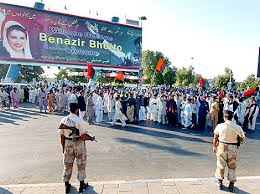
(Credit: equoter.blogspot.com)
It’s been eight years since Pakistan’s former prime minister and one of the country’s most charismatic leaders, Benazir Bhutto, was assassinated in the city of Rawalpindi during an election rally.
Her son Bilawal Zardari, whom she had designated as her political heir in her will, is due to address the Pakistan People’s Party’s (PPP) supporters in Ghari Khuda Baksh, a small town in the southern Sindh province, on Sunday. But Bilawal has neither the leadership qualities nor the support of the masses that his mother or his grandfather, Zulfikar Ali Bhutto, enjoyed. And yet the 27-year-old scion is trying his best to revive the party.
Since 2007, when Bhutto was shot dead by unknown assailants, her widower Asif Ali Zardari has been leading the party alongside his son. After Bhutto’s death, the PPP won the general election in 2008, allowing Zardari to become the president of the Islamic country, but in the 2013 parliamentary vote the party was almost wiped from the political landscape, and was reduced to its Bhutto stronghold in the Sindh province.
Zardari’s administration was marked by massive corruption scandals, incompetent governance, nepotism and the inability to rein in home-grown Islamist militants. But what dissuaded the PPP supporters most was the former government’s lack of will to bring Bhutto’s assassins to justice.
A United Nations commission, set up to investigate Bhutto’s murder at the request of the former government, revealed in its detailed 2010 report that the security arrangements for Bhutto were seriously inadequate, and that some military agencies had tried to hinder the initial investigations.
Former military ruler Pervez Musharraf has also been implicated in the Bhutto murder case. He denies any involvement and blames the Taliban. The Islamist group says it didn’t kill Bhutto.
Veteran politician and PPP senator Taj Haider refutes allegations that the former government didn’t do much to find Bhutto’s murderers.
“It was a very big controversy that resulted from Benazir’s murder,” Haider told DW. “We wanted to be on the right track, and we want to conduct the investigation on scientific lines. In the first place we involved the UN so that the wider parameters of the conspiracy behind her murder would be determined.”
The end of dynastic politics?
But the debate in Pakistani politics has now moved far beyond Bhutto’s assassination. Other big players have emerged on the political scene, such as cricketer-turned-politician Imran Khan.
The reason that these new parties resonate well with a large section of the Pakistani middle class is their emphasis on governance issues – particularly corruption and political accountability. Pakistan has moved beyond grand slogans of socialistic revolution and the charisma of the Bhutto dynasty, barring a small section of Pakistani liberal intellectuals.
New political players have emerged on the political scene, such as Imran Khan
Many urban Pakistanis believe corruption is the biggest impediment to progress in their country, and they hold their politicians responsible. These educated Pakistanis from big cities like Karachi, Lahore, Islamabad and Rawalpindi pin their hopes on the judiciary, which they think has finally gained enough independence to try corrupt legislators and politicians.
But the Pakistani anti-corruption movement is also supported by right-wing parties and the private media, besides the lawyers who initiated the movement in 2007.
“The foremost thing is to change the system. To eradicate corruption from Pakistan, we need to emphasize our morals and the accountability of politicians,” Ahmed bin Mateen, a student in Karachi, told DW.
‘The only true liberal party’
Still, the figure of Benazir Bhutto continues to inspire many liberal activists and intellectuals in Pakistan, who believe that she sacrificed her life for the consolidation and supremacy of democracy.
“The PPP is still the only truly progressive party in Pakistan,” Ahmed Murtaza, a PPP supporter in Lahore, told DW. “It is the only party that can confront the military generals and the rising Islamism in the country. Bhutto will always be our inspiration as an icon of liberal democracy.”
“The anti-corruption movements you see these days promote a right-wing agenda. Bilawal is not an ideal leader, but he is Bhutto’s son and is carrying forward her mother’s mission. We should give him some time,” he added.
‘Zardari’s PPP’
But many people in Pakistan say that Benazir Bhutto’s PPP does not exist anymore – that it died with her in 2007. They say the current PPP is simply Zardari’s party, and that it now pursues a different ideology.
Many people say Zardari’s PPP now pursues a different ideology than Bhutto’s
Naheed Khan, one of Bhutto’s closest aides, who fell out with the former president after Bhutto’s assassination, blames the new party leadership for the downfall of the PPP.
Khan told DW that the PPP’s defeat in the 2013 election was not unexpected. “The present PPP leadership is only interested in power. They have abandoned the PPP ideology,” Khan said.
Khan advised Bilawal Bhutto to revert to his mother and his grandfather’s ideology and distance himself from his unpopular father if he wanted to revive the party.
But some experts say that even Bhutto’s politics were not very progressive. During her second term as prime minister the Taliban invaded Kabul and started their ruthless Islamist rule – some say with the backing of the government in Islamabad.
